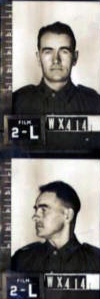Difference between revisions of "George Garratt"
From Our Contribution
| Line 104: | Line 104: | ||
[[Category:Church of England ww2]] | [[Category:Church of England ww2]] | ||
[[Category:2nd/11th (City of Perth) Australian Infantry Battalion]] | [[Category:2nd/11th (City of Perth) Australian Infantry Battalion]] | ||
| − | [[POW ww2]] | + | [[Category:POW ww2]] |
[[Category:1941 POW ww2|*]] | [[Category:1941 POW ww2|*]] | ||
[[Category:Returned to Australia ww2]] | [[Category:Returned to Australia ww2]] | ||
[[Category:Armadale-Kelmscott ww2]] | [[Category:Armadale-Kelmscott ww2]] | ||
Revision as of 02:22, 27 March 2019
 | |
| Personal Information | |
|---|---|
| Date of Birth | 13 Feb 1904 |
| Place of Birth | Hanslope, Buckinghamshire, England |
| Death | 17 Jan 1991, aged 86 |
| Place of Death | Nedlands, Western Australia |
| Age at Enlistment | 35 years, 8 months |
| Description | 5'10" (1.78m) tall ; ; dark complexion ; grey blue eyes ; brown hair |
| Occupation | Market gardener |
| Religion | Church of England |
| Address | Bedfordale, Western Australia |
| Next of Kin | Father , Mr George Garratt |
| Military Information | |
| Reg Number | WX414 |
| Date of Enlistment | 7 Nov 1939 |
| Rank | Private |
| Unit/Formation | 2nd/11th (City of Perth) Australian Infantry Battalion |
| Date of Embarkation | 20 Apr 1940 ‒ 19 May 1940 |
| Ship Embarked On | HMT Y3 Nevasa Fremantle to Kantana in Egypt |
| Date of Return | 30 May 1945 ‒ 7 Jul 1945 |
| Ship Returned On | J10 Liverpool to Sydney |
| Fate |
POW Crete 6 Jun 1941 Returned to Australia |
| Medals |
1939-45 Star Africa Star Defence medal War Medal 1939-45 Australian Service Medal 1939-45 |
Pre War
War Service
Enlisted at Subiaco and taken on strength by the 2/11 Battalion on 8 Nov 1939. On 30 Nov 1939 along with the unit he embarked in Fremantle for the eastern states to join the rest of the 6th Division, returning to Claremont camp on 2 Apr 1940.
George embarked on the HMT Y3 Nevasa on 20 Apr 1940 for Kantana in Egypt.
on 4 Jun 1941 he was listed as Missing, believed to be a prisoner of war, captured in Crete. This was confirmed on 30 Oct 1941, and it was said that he was interred in Stalag XIIIC with his POW Number being 09985.
After arriving in the Middle East, the 2/11th trained in Palestine and Egypt. A decision to reorganise Australian infantry brigades along British lines, with three battalions instead of four, meant the 2/11th was now part of the 19th Brigade, but it remained part of the 6th Division. The battalion went into action for the first time at Bardia on 5 Jan 1941 and, as part of the Allied advance into Italian-occupied Libya, subsequently fought at Tobruk on 21-22 Jan 1941, and to secure Derna airfield on 25 Jan 1941. It was advancing to the south of Benghazi when the Italians surrendered on 7 Feb 1941.
On 10 Apr 1941 they embarked in Alexandria harbour for Greece. The Allied forces, however, were unable to hold back the attacking Germans. The 2/11th withdrew from its initial positions at Kalabaka and remained on the move until it occupied rearguard positions at Brallos Pass a week later. It fought and slowed the Germans there on 24 April and then continued its withdrawal to Megara, where it was evacuated by sea on the night of 25 Apr 1941. The battalion landed on Crete the next day. It was subsequently deployed with the 2/1st Battalion to defend Retimo airfield, which was held tenaciously for ten days following the landing of German paratroops on 20 May. German successes elsewhere on Crete, however, made surrender inevitable. Many 2/11th soldiers attempted to escape from Crete but only a relatively small number ultimately succeeded; most were taken prisoner. On 4 Jun 1941 George was listed as Missing, believed to be a prisoner of war, captured in Crete. This was confirmed on 30 Oct 1941, and it was said that he was interred in Stalag XIIIC with his POW Number being 09985.
On 10 May 1945 he deplaned in the UK from Germany as a recovered POW (8 May 1945) and was sent to the 1st AIF Transit Camp. Here on 10 May 1945 he was granted proficiency pay. He made a statement to the authorities on 11 May 1945 on the circumstances of his capture on 6 Jun 1941 - capitulation of the Island. Ptes Phillips, Horace and E Martin were with him when captured. He was placed in Stalag XIIIC from 7 Aug 1941 until 2 Sep 1941, after which he was moved to AK 7014 until 1 Apr 1945. He described living conditions as indifferent, with straw sack blankets, fair rations, no other clothing until a Red Cross issue was received, and poor sanitary conditions. No recreation facilities were on offer. He was used to do farm work, 12 hours per day for 15 German pfennigs per day. He received regular Red Cross parcels, and had received medical treatment from Stalag XIIIC on 19 Feb 1941 for dysentery.
Along with others he embarked in Liverpool on 30 May 1945 for Sydney where they disembarked on 7 Jul 1945. Returned to Western Australia, on 7 Aug 1945 he was admitted to the 109th Convalescent Depot at Point Walter for medical rehabilitation. On 12 Sep 1945 he was discharged from hospital and was discharged from the Army the following day, 13 Sep 1945.
Post War
In Feb 1982 George's wife Mrs Joan Garratt of 26 Robin Hood avenue, Armadale had written to the authorities seeking information about a medal issued by Greece to which he might be entitled. Daughters born 21 Aug 1948 (Melody Ann) and 7 Aug 1950 (Ruth April). Wife Joan died 30 Sep 2000 aged 81 in Armadale
Notes